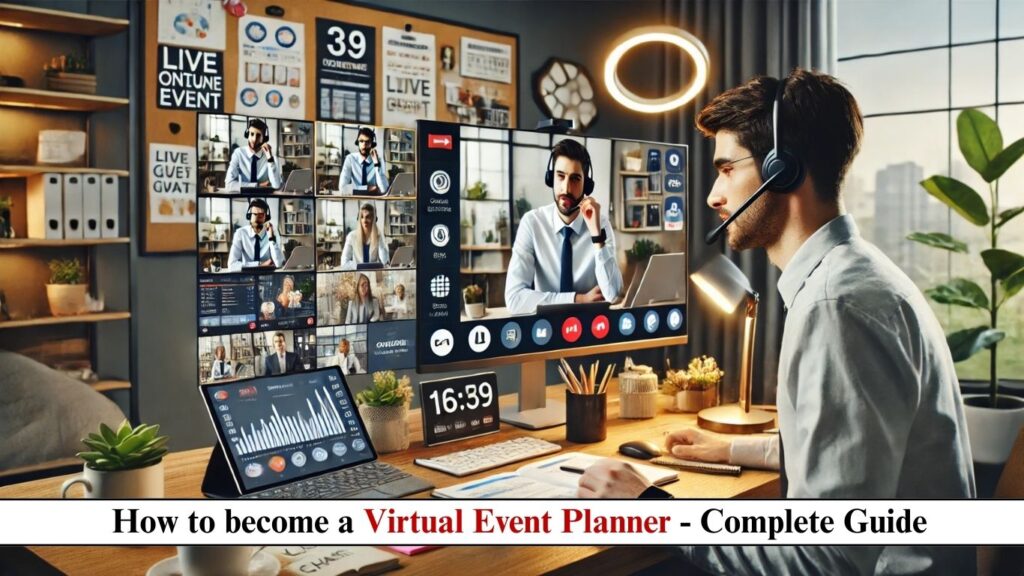
Introduction
The events industry has undergone a digital revolution, with virtual events becoming mainstream for businesses, conferences, and social gatherings. A Virtual Event Planner specializes in designing, coordinating, and executing engaging online experiences.
This comprehensive guide covers everything you need to know about this exciting career, including its history, salary expectations, roles and responsibilities, required qualifications, how to get started, and future trends.
History of Virtual Events
Virtual events have evolved rapidly with advances in technology and changing global needs.
Key Milestones in Virtual Events:
- 1990s: Early webinars and teleconferences laid the foundation.
- 2000s: Platforms like GoToWebinar and Skype enabled basic virtual meetings.
- 2010s: Virtual conferences and hybrid events gained traction.
- 2020 (Pandemic Era): COVID-19 accelerated demand for Zoom, Hopin, and Microsoft Teams events.
- 2024 & Beyond: AI-powered virtual venues, metaverse events, and interactive experiences dominate.
Today, virtual events are a multi-billion-dollar industry, with businesses, educators, and entertainers relying on skilled planners.
Salary of a Virtual Event Planner
Earnings depend on experience, niche, and client type.
Average Salary Ranges:
- Entry-Level (0-2 years): $40,000 – $60,000 per year
- Mid-Level (3-5 years): $60,000 – $90,000 per year
- Expert (5+ years): $90,000 – $150,000+ per year
Factors Affecting Income:
- Freelance vs. Full-Time: Freelancers charge $50 – $200/hour.
- Industry: Corporate events pay more than nonprofit gatherings.
- Specialization: High-tech (VR/metaverse) events command premium rates.
Roles and Responsibilities of a Virtual Event Planner
A Virtual Event Planner handles everything from concept to execution.
1. Pre-Event Planning
- Consulting with clients on goals, budget, and audience.
- Selecting the right platform (Zoom, Hopin, Gather).
- Designing event agendas and run sheets.
2. Technical Coordination
- Managing live streaming, AV setups, and virtual booths.
- Troubleshooting tech issues in real time.
- Ensuring cybersecurity and attendee privacy.
3. Speaker & Attendee Management
- Coordinating with speakers, moderators, and sponsors.
- Handling registrations, ticketing, and email reminders.
- Facilitating Q&A, polls, and networking sessions.
4. Post-Event Follow-Up
- Analyzing engagement metrics (attendance, polls, chats).
- Sending surveys and feedback forms.
- Repurposing content (recordings, highlights, blogs).
Qualifications Needed to Become a Virtual Event Planner
While no strict degree is required, these skills boost credibility.
1. Certifications (Recommended)
- Certified Virtual Event Planner (CVEP)
- Project Management (PMP or CAPM)
- Digital Marketing (Google, HubSpot)
2. Key Skills
- Tech Savvy: Mastery of Zoom, Hopin, Eventbrite.
- Marketing & Promotion: SEO, email campaigns, social media.
- Crisis Management: Handling live tech failures smoothly.
3. Experience
- Background in event planning, marketing, or AV tech helps.
- Volunteer for webinars or nonprofit events to build a portfolio.
How to Get Started as a Virtual Event Planner
Step 1: Learn the Tools
- Take free courses on Zoom, Canva, and event platforms.
- Experiment with virtual event software demos.
Step 2: Choose a Niche
- Corporate: Conferences, product launches.
- Social: Virtual weddings, birthday parties.
- Educational: Webinars, workshops.
Step 3: Build a Portfolio
- Offer free/discounted events for testimonials.
- Document case studies with metrics (attendance, engagement).
Step 4: Market Your Services
- Create a website with past events and client reviews.
- Network on LinkedIn and event planning Facebook groups.
Step 5: Monetize Your Business
- Basic Package: Event coordination ($1,000 – $5,000).
- Premium Package: Full-service planning ($5,000 – $20,000).
- Add-Ons: Post-event analytics, replay editing.
Step 6: Scale Up
- Hire assistants for registration and tech support.
- Partner with speakers and sponsors for commissions.
Future Scope of Virtual Event Planning
The industry is evolving with cutting-edge trends.
1. Hybrid Events (In-Person + Virtual)
- Demand for planners who can manage both formats seamlessly.
2. AI & Personalization
- Chatbots for attendee queries.
- AI matchmaking for networking.
3. Metaverse & VR Events
- 3D virtual venues (e.g., Meta Horizon Workrooms).
- NFT ticketing and virtual swag bags.
4. Sustainability Focus
- Companies prefer carbon-neutral virtual events over travel-heavy meetings.
Conclusion
Virtual event planning is a lucrative, future-proof career blending creativity and tech skills. By mastering platforms, marketing, and client management, you can build a thriving business in this booming industry.
Ready to start? Gain experience, define your niche, and launch your services—the digital events space is wide open!🎤💻













Post Comment